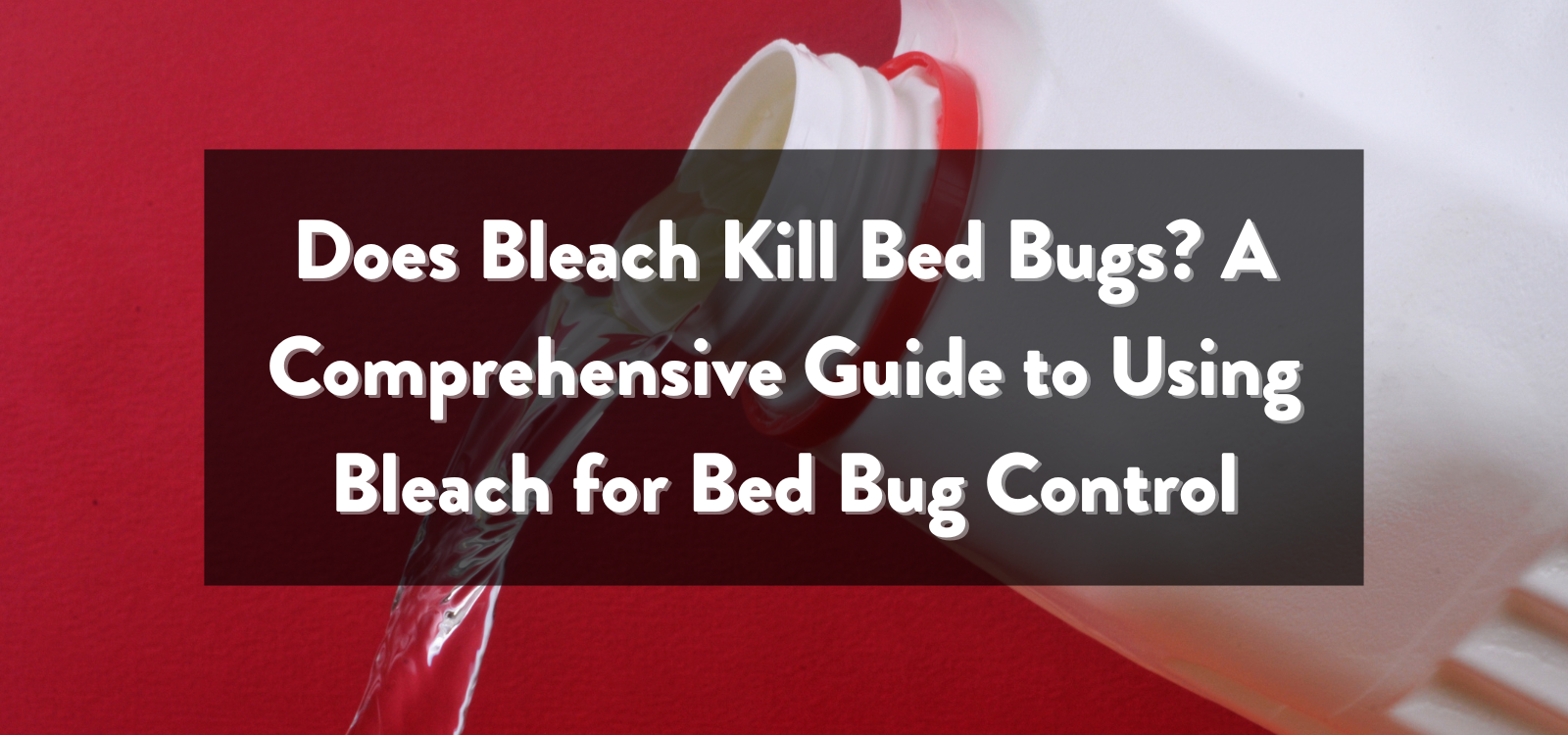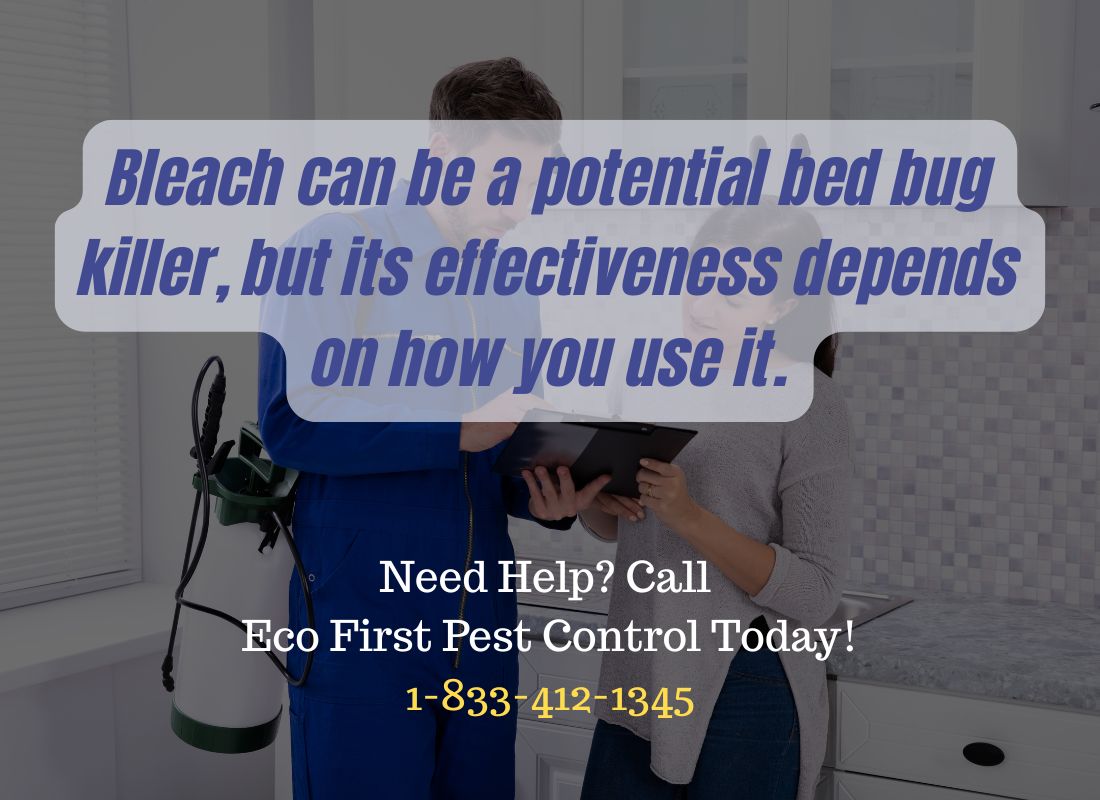
Does Bleach Kill Bed Bugs? A Comprehensive Guide to Using Bleach for Bed Bug Control
Does Bleach Kill Bed Bugs? A Complete Guide to Using Bleach for Bed Bug Control
Bed bugs are some of the most resilient household pests, known for their rapid reproduction and ability to hide in the tiniest crevices. If you've ever faced a bed bug infestation, you've likely wondered: Does bleach kill bed bugs? The short answer is yes, bleach can kill bed bugs, but the long answer is a bit more complicated. In this guide, we'll break down how bleach works against bed bugs, its effectiveness, and some safer, more reliable alternatives.
What Are Bed Bugs and Why Are They So Hard to Kill?
Bed bugs (Cimex lectularius) are tiny, reddish-brown insects that feed on human blood, typically at night. These pests are known for their small size (around 5-7 millimeters long) and flat bodies, which allow them to hide in mattress seams, bed frames, baseboards, and even electrical outlets.
Why Bed Bugs Are Tough to Eliminate
- Rapid Reproduction: Bed bugs reproduce quickly, with a single female laying up to 500 eggs in her lifetime.
- Resistance to Insecticides: Many bed bug populations have developed resistance to common insecticides, making them harder to kill.
- Hiding Skills: Their small, flat bodies enable them to hide in tiny cracks and crevices, avoiding detection.
- Feeding Habits: Bed bugs can survive without a blood meal for several months, patiently waiting for their next opportunity to feed.
Given these traits, it’s no surprise that bed bugs are among the most challenging household pests to eliminate.
How Does Bleach Kill Bed Bugs?
Bleach, a powerful disinfectant and stain remover, contains sodium hypochlorite, which is known for its ability to break down proteins. This makes it a potential bed bug killer, but its effectiveness depends on how you use it.

Why Bleach Can Kill Bed Bugs
- Cell Destruction: Bleach disrupts the proteins in bed bugs’ exoskeletons, essentially breaking down their cells and causing them to die.
- Strong Odor: The harsh smell of bleach can also deter bed bugs from returning to treated areas, though this is not a reliable long-term solution.
- Drying Effect: Bleach can dehydrate bed bugs, making it harder for them to survive.
However, the effectiveness of bleach largely depends on direct contact. Bed bugs must be sprayed directly or come into contact with a bleach-soaked surface for it to work.
Will Bleach Kill Bed Bugs Instantly?
No, bleach will not kill bed bugs instantly. Unlike some professional treatments, which can knock down bed bugs on contact, bleach works more slowly as it needs time to break down the bug’s protective outer layer.
Factors That Influence the Speed of Bleach’s Effectiveness
- Concentration of Bleach: Higher concentrations may be more effective but are also more dangerous to use.
- Contact Time: Bleach needs to stay on the bug long enough to penetrate its exoskeleton.
- Surface Absorption: Porous surfaces may absorb the bleach, reducing its killing power.
- Eggs and Nymphs: Bed bug eggs are especially tough and often require multiple treatments.
For a more comprehensive guide on the effectiveness and limitations of using bleach, you can check out this in-depth guide on bleach and bed bugs.
How to Use Bleach to Kill Bed Bugs (Step-by-Step Guide)
If you decide to use bleach as part of your bed bug control strategy, it’s important to do it correctly to avoid damaging your belongings and risking your health.
Materials Needed
- Household bleach (unscented, high concentration)
- Spray bottle
- Protective gloves and mask
- Old cloths or rags
- Laundry detergent
- Hot water
Steps to Use Bleach on Bed Bugs
- Prepare the Area: Strip all bedding and wash in hot water with a strong bleach solution.
- Mix the Bleach Solution: Use a 1:1 ratio of bleach to water for spraying. Be careful, as undiluted bleach can be harmful.
- Apply the Bleach: Spray infested areas thoroughly, including mattress seams, bed frames, and baseboards. Make sure to get the solution deep into cracks and crevices.
- Ventilate the Room: Open windows and use fans to help dissipate the strong bleach fumes.
- Repeat as Needed: Bed bugs are notoriously tough, so you may need to repeat this process several times.
However, bleach is not without its risks. It can discolor fabrics, damage wood, and pose respiratory hazards if inhaled in large quantities.
Does Bleach Kill Bed Bug Eggs?
One of the biggest challenges in eliminating bed bugs is their eggs. These tiny, milky-white ovals are usually hidden deep within cracks, crevices, and mattress seams, making them difficult to find and even harder to kill.
Why Bed Bug Eggs Are So Resilient
- Protective Coating: Bed bug eggs are covered in a sticky, protective substance that helps them adhere to surfaces and shields them from many chemical agents.
- Small Size and Strategic Hiding: These eggs are only about 1 millimeter long, making them nearly invisible without close inspection.
- Rapid Hatching Time: Bed bug eggs hatch in about 6 to 10 days, meaning you have a small window to eliminate them before they become active, biting nymphs.
Effectiveness of Bleach on Bed Bug Eggs
While bleach can kill bed bug eggs, it is far less effective than professional methods. The bleach must directly contact the eggs to work, breaking down their protective outer layer and penetrating the inner membrane. However, even if you manage to spray bleach on every visible egg, you’re unlikely to reach the hidden ones deep inside mattress seams or behind baseboards.
For a more robust solution, consider using a combination of heat treatment, vacuuming, and professional-grade pesticides, or explore these bed bug control services for more reliable results.
Pros and Cons of Using Bleach for Bed Bug Control
Bleach can be an effective tool against bed bugs in some cases, but it comes with significant drawbacks.
Pros:
- Readily Available: Most households already have bleach on hand, making it a convenient option.
- Low Cost: Bleach is relatively inexpensive compared to professional extermination services.
- Immediate Results: When used correctly, bleach can kill bed bugs on contact.
Cons:
- Surface Damage: Bleach can permanently discolor fabrics, wood, and carpets.
- Health Risks: Inhaling bleach fumes can cause respiratory problems, eye irritation, and skin burns.
- Limited Reach: It is nearly impossible to reach all bed bugs and their eggs with bleach alone.
- Resistance Concerns: Bed bugs may develop resistance over time, making bleach less effective in the long run.
Given these pros and cons, it’s essential to weigh your options carefully before relying solely on bleach for bed bug control.
Alternative Bed Bug Control Methods
While bleach can kill bed bugs, there are safer, more effective ways to handle an infestation.
Heat Treatment
Bed bugs and their eggs cannot survive extreme heat. Washing infested clothing and bedding in hot water (at least 120°F) and drying on the highest heat setting can effectively kill these pests. Professional heat treatments can also be used to heat entire rooms or buildings.
Vacuuming and Steaming
Using a vacuum with a HEPA filter to suck up bed bugs from cracks, crevices, and mattress seams is a great first step. For deeper penetration, steam cleaning at temperatures above 200°F can kill bed bugs on contact.
Professional Extermination
If your infestation is severe or recurring, it might be time to call in the professionals. Companies like EcoFirst Pest Control offer specialized bed bug treatments that go beyond what DIY methods can achieve.
Natural Remedies
For a more eco-friendly approach, consider using diatomaceous earth or essential oils like tea tree or lavender. However, these methods are generally less effective than chemical or heat treatments.
To get a full breakdown of the most effective methods, check out this comprehensive guide on how to kill bed bugs at home.
Preventing Future Infestations
Once you’ve eliminated bed bugs, prevention is the key to keeping them from coming back.
Practical Prevention Tips:
- Encase Your Mattress: Use bed bug-proof mattress and pillow encasements to prevent future infestations.
- Regular Inspections: Check for signs of bed bugs whenever you travel or buy second-hand furniture.
- Clutter Control: Reduce clutter in your home to eliminate hiding places for bed bugs.
- Seal Cracks and Crevices: Use caulk to seal any cracks in your walls, floors, or furniture.
- Isolate Your Bed: Keep your bed away from the walls and use bed bug interceptors under bed legs.
For more in-depth tips on bed bug prevention, check out this guide on effective bed bug control.
When to Call a Professional Exterminator
If you’ve tried DIY methods and still see bed bugs, it might be time to call a professional. Companies like EcoFirst Pest Control offer targeted, expert solutions that can eliminate bed bugs quickly and effectively.
Final Thoughts on Using Bleach for Bed Bug Control
While bleach can kill bed bugs on contact, it is far from a perfect solution. It’s messy, potentially hazardous, and often ineffective at reaching all the hidden bugs and eggs. For a more comprehensive and lasting solution, professional bed bug control is often the best choice.
Frequently Asked Questions (FAQs)
Q1: Can bleach kill bed bugs instantly? No, bleach does not kill bed bugs instantly. It requires direct contact and time to break down the bed bug’s exoskeleton.
Q2: How long does it take bleach to kill bed bugs? Bleach can take several minutes to hours to kill bed bugs, depending on the concentration and contact time.
Q3: Is it safe to use bleach on mattresses? No, bleach can damage fabric and foam, potentially ruining your mattress.
Q4: Will bleach kill bed bug eggs? Yes, but only with direct contact, and even then, it’s less effective than other methods.
Q5: What is the most effective way to kill bed bugs? Professional extermination, heat treatments, and regular cleaning are the most effective methods.